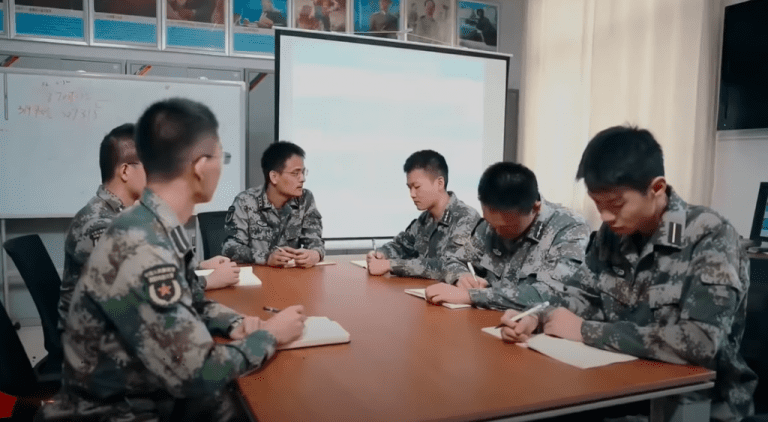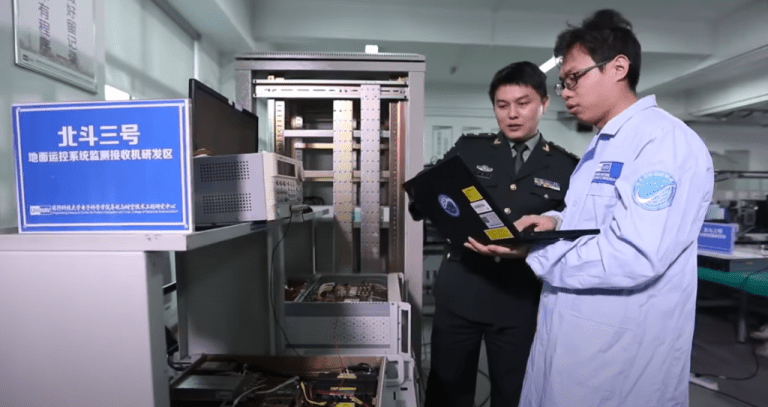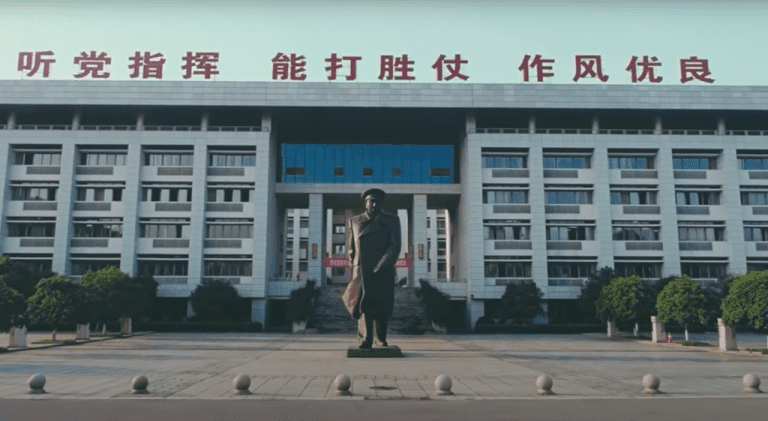For years, dozens of Chinese researchers from a military university worked at TU Delft. Did they acquire knowledge for the Chinese army? This fear seems to be grounded.
The NUDT is completely in the service of the Chinese People’s Liberation Army and falls under the Central Military Commission. (Artwork: Liam van Dijk)
What does this article discuss?
- At least 29 Chinese doctoral candidates and guest researchers from the National University of Defense Technology (NUDT) gained research experience at TU Delft on subjects that could partially be used for military purposes.
- One of the people from NUDT says in a Chinese newspaper that his “mission” is to “gain knowledge for the army”.
- After their time at TU Delft, many returned to NUDT to continue research which would benefit the People’s Liberation Army. One researcher is now in the service of the People’s Liberation Army.
- A guest researcher who was at TU Delft in 2014 and 2015, was at the time also associated with a research institution that was established by CETC, a state owned company. This company developed technology that was used to oppress the Uighurs.
With its concrete promenades, tidy flower beds, lawns carefully mown to the millimetre, and strolling students, the main campus of the National University of Defense Technology (NUDT) is a replica of the thousands of other Chinese universities. But appearances can be deceptive. The University is completely in the service of the Chinese People’s Liberation Army and falls under the Central Military Commission, the most important military agency in China. The NUDT trains top military scientists that the Australian think tank ASPI asserts focuses on military technology and dual use research. This is research that has both civilian and military applications.
Research by Delta shows that at least 29 scientists at NUDT earned their doctorates or were guest researchers at TU Delft. Most of them did a master’s at the NUDT and then got their doctorate at TU Delft to then return to the top military institute in China. A smaller number of doctoral candidates were associated with both TU Delft and the NUDT during their research time. The editors also came across a scientist who started working for the People’s Liberation Army after he left TU Delft. Doctoral candidates from the NUDT are, just like other Chinese doctoral candidates, relatively attractive for Western universities because they usually bring their own grants from the China Scholarship Council (CSC).
Delft is popular
According to ASPI, the international research activities of NUDT students are part of a military strategy. They say that the army intentionally sends scientists to universities abroad for dual use research that can be used for both civilian and military purposes. This helps speed up the development of Chinese military technology, assert the researchers. In total, since 2007, Chinese military services have sent about 2,500 academics to universities abroad to acquire new knowledge. TU Delft is thus no exception, even though it is a popular destination. TU Delft is seventh in the world in terms of the number of joint publications with NUDT academics. Other Dutch universities do not appear in the rest of the top 10. Navigation technology, computer sciences and artificial intelligence are the most popular research areas for NUDT doctoral candidates at universities abroad.

A promotional video shows NUDT students being taught (Source: Still Youtube)
The Chinese scientists at TU Delft too do research that has dual use applications. Delta viewed 115 publications and found that NUDT doctoral candidates worked on subjects such as radar technology, models for war simulations, quantum computing, unmanned aircraft, algorithms for analysing and influencing users of social media, satellite navigation, optimising complex combat missions and the localisation of objects under water.
PhD candidate with a mission
TU Delft is not always aware of the intentions of Chinese doctoral candidates. “NUDT researchers come to TU Delft to obtain a doctorate,” says TU Delft China Ambassador Peter Wieringa in an interview with Delta. “That is their objective.” Delta editors came across a Chinese newspaper article that sketches a different, more worrying, image of NUDT students at TU Delft. In 2017, the Chinese newspaper (in Chinese) Hunan Today talked about a ‘PhD candidate in the Netherlands’ who made no secret of his mission. ‘The country and the army chose us to study abroad in the hope that we will learn the most advanced science and technology and further today’s most important task: strengthening the army in the future. We must keep this mission in mind and work hard so that we can create a strong foundation for the army through science and technology,’ noted a journalist. Research by Delta shows that the PhD candidate had studied at TU Delft.
The editors know the identity of that researcher. Repeated efforts to contact the researcher who has now obtained his/her doctorate, have led nowhere. However, Mathijs de Weerdt (Faculty of Electrical Engineering, Mathematics & Computer Science, EEMCS), his supervisor at TU Delft, was prepared to respond. He said that he had gotten to know the PhD candidate as a clever researcher and that he “could not imagine that the person in question actually means what the quote says. He could have said this because that was what was expected of him.”
In 2016, the Chinese state broadcaster CCTV reported on a visit of the Chinese President Xi Jinping to the NUDT.
Before he took the PhD candidate under his wing, De Weerdt first gathered information from a TU Delft employee who worked on the admission of Chinese CSC students. He added that his research group does not do defence research and that he had consciously agreed with the PhD candidate that he would choose a subject that could not be used by the army. “We chose to study an abstract problem that would allow the new solutions to be used for all sorts of purposes.” He will, however, “think more carefully and discuss it before I take on another similar student, despite the fact that the research trajectory went very well.”
Through the wall
According to the Rathenau Institute think tank, more and more research is dual use and the distinction between civilian and military applications only emerges later, sometimes only when a product is finished. That research can be dual use is in itself not a reason to reject collaboration, say experts. But universities and academics should be aware of who they are dealing with and make well considered agreements.
Professor Yarovoy (EEMCS), who does a lot of radar research for his research group on microwave sensing, signals and systems, accepted three NUDT doctoral candidates between 2014 and 2019. As was the case with his EEMCS colleague De Weerdt, he talked at length with the doctoral candidates before he assigned them a PhD position. In 2014 and 2015, he also worked with a guest researcher from the NUDT: Tian Jin. They co-published an article entitled A Through-the-Wall Radar Imaging Method Based on a Realistic Model.

Two NUDT scientists discuss a research project in propaganda video. (Source: Still YouTube)
According to the defence experts that Delta spoke to, through-the-wall radar technology is used by the military to detect people behind walls. Yarovoy, however, says that his research had nothing to do with the army. It only had civilian applications such as localising people under rubble after an earthquake or monitoring people’s health. Yaravoy’s group is currently developing a proof-of-concept for the latter. The radar system can measure the walking speed and the step length of a person indoors and send an alarm if these deviate from the norm.
Militarily deployable
“Civilian and military applications both require completely different radar technologies,” said an EEMCS communications staff member. She pointed out that in the case of TU Delft technology, the radar signals are received very slowly and do not go beyond one and a half metres. This is not relevant for military applications. “The technology for civilian applications can be compared to the speed of a horse and cart. People want to work with a Ferrari for military applications.”
Delta showed the scientific publication to defence experts, and they think differently. They believe that the research is relevant for and usable by the military. They brush aside the claim that civilian and military applications require completely different radar technologies. Danny Pronk, former staff member of the AIVD and MIVD intelligence agencies and now a defence expert at the Clingendael Institute, says “The literal application of the radar technology may be different in part, but you need to see it in a broader context. The underlying theory, technology and calculation models largely overlap and can be further developed in the military.”
Connection with the People’s Liberation Army
There is another striking aspect about the research: in the publication, guest researcher Tian Jin is not only associated with the NUDT and TU Delft, but also to the Collaborative Innovation Center of Information Sensing and Understanding. The People’s Liberation Army is a partner (in Chinese) of this research institution that was founded by a Chinese university and the China Electronics Technology Group Corporation (CETC). This state owned company is the most important producer of military electronics, and it and two of its 523 subsidiaries have developed technology that is being used to track Uighurs. Its daughter company, Hikvision, sells cameras that can be used for (in Dutch) facial recognition and for ethnicity recognition. They are keeping a close eye on the Uighur population in the province of Xinjiang. Another daughter company, the Xinjiang Lianhai Cangzhi Company, processes algorithms and apps that, according to Human Rights Watch, are also used to track Uighurs.
‘Scientists at least bear defence applications in mind‘
President Xi Jinping wants China to have the most advanced army in the world by 2049, when the People’s Republic celebrates its 100 years. Made in China 2025 is an ambitious Government programme to make the country the world leader in the area of information technology, numerical control tools, equipment for aerospace and high tech ships. To turn this ambition into a reality, Beijing is proactively seeking knowledge abroad. To Pronk, this only makes it even more likely that civilian knowledge will be used for military purposes. “Scientists at least bear defence applications in mind. Furthermore, CETC operates directly in line with the strategic multi-year plans and policy initiatives such as Made in China 2025 and Military-Civil Fusion.”
‘Suspicious’ studies
Delta came across more studies that need explanation. For example, one study from 2015 about optimising complex combat missions leaves little to the imagination: An Approach for Weapon System-of-Systems Scheme Generation Based on a Supernetwork Granular Analysis. Danny Pronk explains that “This research builds on network-centric warfare. This is a military doctrine that arose in the USA in the 1990s. The idea is that you combine all your weapon systems so that they all strengthen each other.”

A faculty of the NUDT. (Source: Still YouTube)
At the time, one of the authors of this article, Shanfei Li, was the research PhD candidate in Professors Karen Aardal and Dion Gijswijt’s Optimisation subject group (EEMCS). Delta asked both professors whether they think that the Chinese army benefited from the knowledge that was acquired at TU Delft. ‘We can hardly imagine that the outcomes in this article have any military use,’ they answered in an email. They pointed out that the publication had nothing to do with the research that they themselves did with Shanfei Li. “We do not place any restrictions on working with others on any researcher in our group. But we do expect openness. We would therefore rather have seen that Shanfei Li told us about this.”
Drones
Drones are another hot topic. One of the publications that Delta found was about the safe flying of drones in busy airspaces. It is written by a group of people from NUDT and an alumnus of NUDT that, at the time of the publication, worked in the group of Professor Alexander Verbraeck in the Multi-actor Systems Department (TPM).
Verbraeck said that the research was carried out before the doctoral candidate came to work in his group. “It has nothing to do with the doctoral research at TU Delft.” He said that he is aware that knowledge that is acquired during a PhD process goes back to the NUDT. “I have no illusions about this. I am thus extremely careful in the selection of the subjects and the cases, and have no research done into drones.”
‘Knowledge that is acquired during a PhD process goes back to the NUDT’
Research is always published and is then accessible to everyone, regardless of who carried it out. But according to Verbraeck, “a student does return home with more detailed information than what is in the dissertation and in the article.”
“Besides,” he adds, “we should not be naïve. I do think that we would be fooling ourselves if we assume that a collaboration with non-military universities are any less risky. Whichever Chinese university you work with, knowledge will pass on to the army.”
No monitoring of doctoral candidates
Just like other Dutch universities, TU Delft does not have an overarching system to monitor international doctoral candidates. TU Delft places the responsibility in part on the individual professors and promotors. TU Delft China Ambassador Peter Wieringa says “Someone comes to TU Delft with a valid master degree to do doctoral research. It is then up to the promotor to assess if the person has come with the right intentions.”
Not every TU Delft researcher agrees. De Weerdt of EEMCS pleads for a coordinated approach in which the Dutch Government or the EU sets clear rules. “Of course while we should be expected to think about it and look at the context, it should not be left to individual researchers like myself.”
Everyone points at each other
The examples that Delta came across largely stem from a time that the Western academic world knew nothing about the NUDT strategy to send scientists abroad. A research report entitled Picking flowers, making honey that ASPI published in October 2018 changed this. Despite the awareness, concrete actions preventing undesirable knowledge transfer did not happen. While the Government repeatedly pointed to the risks involved in scientific collaboration with China in policy papers and urged universities to take action, the universities pointed to the Government. “The Government must set boundaries that are clear and enforceable and made in consultation with us,” said Vice Rector Magnificus Rob Mudde in 2019 in an interview with Delta. TU Delft did appoint a Senior Policy Advisor China that year.
‘It is really hard to work out if someone has a hidden agenda’
The impasse came to an end at the end of 2020. TU Delft, other universities and the Government are gathering together to come up with a joint policy. And the Ministry of Education, Culture and Science is working on a ‘reference framework’ for individuals that may be coupled to the issuing of visas. In this case, the Government will take the responsibility to screen people and, if necessary, deny them visas. People will not be rejected on the basis of their nationality, but the backgrounds of researchers who want to come to work or study in the Netherlands will be assessed. The universities and the Ministry are now discussing how to give shape to this. Among the steps that universities will have to take are to keep track of the doctoral candidates, including international ones, that they have in-house, and they will have to list the cooperation agreements that they have with international knowledge institutions and companies. This assessment framework will take effect in 2023 at the earliest, wrote (in Dutch) Minister van Engelshoven to the House of Representatives in November last year.
No matter how hard you try, Wieringa believes that it is virtually impossible to avoid NUDT scientists actively acquiring knowledge for the Chinese army. “It is really hard to work out if someone has a hidden agenda.”
Annebelle de Bruijn en Tomas van Dijk
This article is part of series about academic cooperation with China. Read our other stories too.
- The Sons: about how TU Delft inadvertently helps the Chinese army.
- Striking a balance: TU Delft scientists talk about their considerations in working with Chinese counterparts.
- The history: about how the view of collaboration with China has changed over the years.
- Our journalistic statement of accountability on the hows and whys of our China-investigation.



Comments are closed.